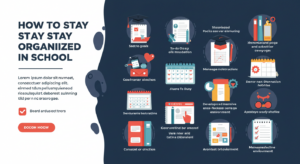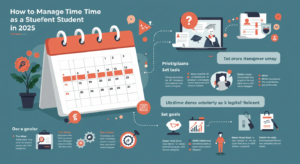
Academic achievement depends entirely on the set of habits students develop while they pursue their education. Study habits represent the regular behaviors people use to study material through learning and concept review and examination preparation. These practices determine your capacity to receive information and hold it while developing the skills needed to utilize it effectively.
Good study habits can:
- Reduce stress and anxiety around exams
- Improve your understanding of complex topics
- Boost your grades and academic performance
- Save time through efficient learning methods
- Build confidence in your academic abilities
Your learning experience requires strong study practices like the way an entire house needs a robust foundation. The guide will teach you productive methods to establish productive study routines which fit your individual learning approach and class timetable.
This guide introduces verified methods to establish a perfect study area and learn time management while promoting academic-life synergy. Your developed skills will enable lifelong learning success starting from your current academic phase.
Understanding Study Skills
You can use study skills as the methods which combine planning and understanding information for better memorization. Such abilities involve more than simple memorization because they include proper note taking methods and effective time management strategies and individualized studying techniques.
Your capabilities in studying matter significantly for earning better grades. Such tools function as personal learning resources that each student can utilize.
- Active Reading: Engaging with text through highlighting, annotations, and questioning
- Information Processing: Breaking down complex concepts into smaller parts
- Memory Techniques: Using memory aids like mnemonics, visualization, and association
- Organization Skills: Keeping your materials, schedules, and resources in order
- Critical Analysis: Assessing information and making connections between ideas
Developing these skills early on in your education can have a positive impact. Students who learn effective study techniques in their early years:
- Adapt more easily to increasing academic challenges
- Feel less stressed during exams
- Remember information for longer periods of time
- Become better problem solvers
- Gain confidence in their ability to learn
Study methods that you develop strengthen your abilities for tasks beyond academic use. The methods which help you study will serve you as you develop work abilities and maintain difficult projects into adulthood. Having effective learning abilities forms a useful skill that benefits any professional path you choose to follow.
1. Creating an Optimal Study Environment
Study environment plays an essential role since it determines your ability to focus and keep information in memory. Research from the Harvard Business Review shows that an optimal study space design can increase productivity by 40% according to findings.
Key Elements of an Effective Study Space:
1. Location Selection
Choose a location that suits your preferences and minimizes distractions. Consider options such as:
- A quiet library corner
- A dedicated home office
- An empty classroom
- A peaceful coffee shop
2. Physical Setup
Ensure that your study space is comfortable and conducive to learning. Pay attention to the following aspects:
- Proper lighting (natural light or adjustable desk lamp)
- Comfortable chair with good back support
- Clean, organized desk surface
- Room temperature between 68-72°F (20-22°C)
Minimizing Distractions
Your study space should be a distraction-free zone. Put your phone on silent mode or use apps like Forest or Freedom to block distracting websites. Keep only essential study materials within reach.
Personalization Tips:
Make your study environment more inviting and motivating by incorporating personal touches:
- Add plants to improve air quality and reduce stress
- Use noise-canceling headphones if needed
- Keep healthy snacks and water nearby
- Display motivational quotes or goals
Every person requires a certain environment for optimal work performance. Experiment with different spots for study sessions to determine your highest learning potential area. Students have different individual preferences regarding background noise when they study since some need full quiet and others benefit from small environmental sounds. Selecting the environment that works best for your focus and learning potential and then implementing continuous use of it represents the key.
2. Developing a Structured Study Schedule
When a student develops a planned study schedule it replaces frantic sudden salvos of studying with consistent learning progress. Modification of study session distribution throughout time results in superior brain processing and better information retention than single massive information intake.
Creating Your Weekly Study Schedule:
- Map Your Fixed Commitments
- Classes and lectures
- Work shifts
- Family responsibilities
- Exercise routines
- Identify Peak Performance Hours
- Track when you feel most alert and focused
- Schedule challenging subjects during these times
- Reserve easier tasks for lower-energy periods
- Allocate Subject-Specific Time Blocks
- Assign 30-50 minute focused sessions per subject
- Include 10-minute breaks between blocks
- Plan harder subjects earlier in your schedule
Smart Time Management Tips:
- Use a digital calendar or physical planner to visualize your schedule
- Set specific study goals for each session
- Color-code different subjects for better organization
- Build in buffer time for unexpected events
- Schedule regular review sessions for each subject
Balance Study and Life:
- Designate free time for hobbies and socializing
- Block out meal times and exercise
- Include self-care activities in your schedule
- Plan one day off per week for mental refreshment
Your schedule needs regular adjustments according to your upcoming exam dates and assignment submission and project deadline dates. Students who organize their study with flexible structure keep their habits steady as they handle academic determinants.
3. Utilizing Active Learning Techniques
Active learning allows students to transition from being vessels to receiving information into players who actively engage with their study path. Multiple tested methods exist to increase understanding and retention which we can analyze.
Sketchnoting
- Create visual representations of concepts using simple drawings
- Combine text, images, and arrows to show relationships
- Use different colors to highlight key points
- Add personal symbols that make sense to you
Note Summarization
- Write concepts in your own words
- Create mind maps connecting related ideas
- Break down complex topics into smaller chunks
- Record examples that relate to your personal experience
Self-Testing Strategies
- Create flashcards for key terms and concepts
- Practice with past exam questions under timed conditions
- Explain topics to others without referring to notes
- Write sample questions you think might appear on tests
Digital Tools for Active Learning
- Anki: Spaced repetition flashcard system
- Quizlet: Interactive study sets and games
- Kahoot: Self-paced quiz creation
- Mind mapping software like XMind or MindMeister
Active engagement strategies enable students to understand information in a profound way. Studies demonstrate that active learning approaches enable students to keep 90% of information compared to passive reading which results in retention of 10% only. Your study routine benefits from inserting selected techniques which strengthen neural connections between brain cells while developing deeper knowledge of your curriculum.
4. Embracing the Power of Spaced Repetition
Spaced repetition stands as one of the validated methods for retaining information for extended durations. The review method known as spaced repetition shows better results than immediate memorization because it stretches out learning sessions at growing time periods.
Here’s how you can use spaced repetition effectively:
- Day 1: Review new material within 24 hours of learning it
- Day 3: Revisit the material after a 2-day gap
- Day 7: Review again after a 4-day interval
- Day 14: Study the content after a week
- Day 30: Final review after two weeks
The tools Anki and SuperMemo automate the process of learning according to individual progress. The applications monitor your learning development then optimize review periods according to your results. Additional information regarding effective FSRS tool usage appears in various posts and articles about the topic.
Tips for Successful Implementation:
- Break down complex topics into smaller, manageable chunks
- Create flashcards with clear, concise information
- Review material actively by explaining concepts out loud
- Track your progress to identify areas needing extra attention
- Adjust intervals based on your retention level
The evidence indicates that students implementing spaced repetition obtain 90% better recall of information than typical studying practices. The technique brings optimal results with content that needs memorization like both language learning and scientific vocabulary and historical time periods. The impact of this method becomes clearer when one investigates the fact that 90% of all received information can be lost if retention strategies are insufficient.
5. Balancing Study Time with Self-Care Practices
Success at school requires you to protect your wellness instead of abandoning it. Students who want to succeed must allocate specific blocks for self-care practices which both boost their physical energy and mental vitality.
Essential Self-Care Activities During Study Periods:
- Walk for ten minutes between academic sessions to gain better energy.
- Reduction of stress can be achieved through daily deep breathing exercises and meditation sessions.
- Plan routine exercise sessions which need to total 30 minutes every day.
- Make sure to sleep during consistent hours while getting 7-8 hours of rest.
- Weekend plans for social involvement with friends are important to schedule.
Creating Your Balance Sheet:
- Write down your weekly reponsibilities which include courses, studies and work assignments
- Reservation of dedicated time intervals must be established especially for eating and sleeping as well as exercise.
- Ongoing Blocks of Unoccupied Time Must Be Recognized for Hobbies as Well as Social Activities
- Revision of your time schedule should match the test periods along with your academic due dates.
Quick Self-Care Breaks During Study Sessions:
- Stretch your muscles every hour
- Drink water regularly
- Step outside for fresh air
- Listen to calming music
- Practice mindful eating during meal breaks
Your cognitive abilities to learn depend entirely on your physical and mental health status. During periods of stress lower your study workload instead of dropping your self-care practices. The body absorbs knowledge most efficiently when it has received proper rest compared to when it remains without rest.
6. Seeking Help When Needed: Leveraging Academic Support Resources
The struggle to tackle academic tasks remains a normal experience throughout the learning experience. The ability to recognize your need for help and get support shows great strength instead of indicating any sort of weakness. Various academic support resources are available to you for study success. Explore these resources through the following actions.
On-Campus Resources:
- Write down your weekly responsibilities which include courses, studies and work assignments
- Create specific blocks for your essential activities such as eating and sleeping and physical exercise.
- Ongoing Blocks of Unoccupied Time Must Be Recognized for Hobbies as Well as Social Activities
- Revision of your time schedule should match the test periods along with your academic due dates.
Peer Support Options:
- Join study groups to share knowledge and learn from classmates
- Find a study buddy for accountability and mutual support
- Participate in peer tutoring programs offered by your institution
Online Learning Platforms:
- Khan Academy – Free video lessons and practice exercises
- Quizlet – Interactive flashcards and study sets
- Coursera – Expert-led courses to supplement your learning
- YouTube educational channels specific to your subject area
Professional Support:
- Private tutors for personalized learning experiences
- Academic coaches for developing study strategies
- Subject matter experts in your field of study
- Learning disability specialists if you need accommodations
The students who achieve most success typically look for assistance when they need help. Your educational institution invests in such resources to benefit your academic journey thus you should take advantage of them.
Finally, Good study habits create lifelong abilities to learn which students develop through their educational journey.
Your present study practice develops abilities which will impact your future learning potential. You will accumulate skills beyond academic accomplishment which transform into professional strengths. Strong study practices enhance:
- Critical thinking abilities – helping you analyze complex problems
- Time management expertise – enabling efficient work-life balance
- Self-discipline – building resilience and perseverance
- Adaptability – preparing you for continuous learning
Your established study routines transform into powerful professional habits. You’ll find yourself applying these techniques when:
- Learning new job skills
- Pursuing certifications
- Adapting to industry changes
- Taking on leadership roles
Professional progress in the digital age requires continuous training which transforms your improved study methods into performance assets. Once you learn effective study practices they serve as your future base for achieving success in your selected career path.
Start implementing these strategies today. Your educational and professional objectives approach with each incremental improvement in your study routines.
FAQs (Frequently Asked Questions)
Students need to understand what study habits are along with their significance toward achieving academic success.
Students use study habits as their regular practices and techniques which help them learn and keep information effectively. Student achievement needs study strategies because they enhance learning and improve performance while providing an organized system for studying.
How can I create an optimal study environment?
The best conditions for studying emerge when students select a quiet area away from distractions. Check that you have a comfortable area that contains all needed materials at hand. A study environment that combines good lighting, minimal noise and a tidy workspace functions as an important factor for enhanced focus and concentration.
What is a structured study schedule and how do I create one?
The planned outline of study sessions functions as a structured study schedule to effectively organize time when used properly. You need to establish a study plan that includes choosing your subjects or topics followed by designating dedicated study periods and adding breaks then setting specific objectives to maintain your studies alongside recreational activities
What are active learning techniques and how do they benefit my studies?
Active learning strategies include two types of student engagement with the content material which include sketchnoting and note summarization. Such educational methods help students develop both comprehension and memory retention of information better. The use of flashcards enables students to increase the effectiveness of their revision while testing their own knowledge.
What is spaced repetition and how does it improve learning?
Through spaced repetition people engage in purposeful information review throughout periods of increasing duration instead of conducting intense last-minute learning. through spaced repetition people retain information better over time since ongoing review sessions strengthen their acquired knowledge.
How can I balance my study time with self-care practices?
In order to achieve balance students should incorporate social activities together with hobbies and exercise alongside mindfulness practices into their academic schedules. Prioritizing personal care activities preserves overall wellness during academic peak times to achieve improved attention and work quality in academic endeavors.








Leave a Reply